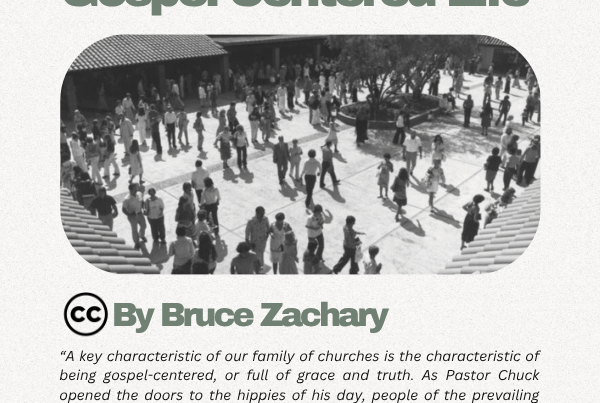
The day began like any other. Getting myself up and ready to face the world at my job, along with the anticipation of seeing my grandchildren’s faces later in the day. But as I was putting on eye makeup, I suddenly found myself in a desperate place and subsequently landed in front of a doctor at our local urgent care clinic.
As I’d applied my pencil eyeliner that morning, a sliver of wood shaving flicked into my right eye. Immediately my eye watered uncontrollably, becoming red as a beet, and the pain! It felt as though someone was poking a needle into my eye, over and over.
I begged my husband, Wayne, to drive me to the clinic as I had to hold my eyelid open to prevent blinking and thus aggravating the sliver impaled in my eye. This doctor sent me to an ER in downtown Seattle, for they alone had an ophthalmologist on call 24/7.
We arrived at a scene of total chaos in Seattle: the largest ER trauma center serving five states. Patients surrounded me, many of them yelling at everyone but no one in particular. My son Nick walked over from his nearby hospital job and started advocating for those “numbing drops” that took away the pain instantly (but wore off in 20 minutes).
I was told I had an abrasion or worse, a laceration on my cornea. This ER eye doc spent nearly an hour closely examining me with all the specialized equipment. I begged once again for more of those “numbing drops,” but his response surprised me. “Mrs. Taylor, I know that works, but the drops have been found to melt the cornea if overused, so no, you’ll have to endure this pain for a while longer.”
“There’s something impaling my eyeball,” I complained. He assured me nothing was there anymore, except that my cornea had suffered four abrasions that affected my line of sight. After completing a vision test, I couldn’t even see the largest letter on top of the chart!
Lessons Learned in the ER
What I didn’t say to the doctor was that I’d been having a conversation while in the waiting room. “Lord, please take this piece of wood out of my eye! Please, I’ll never criticize again. I’ll stop trying to take the speck out of everyone else’s eye. I’ll only deal with the plank in my own if You take this one away. Please have mercy on me, Lord!”
After my eye recovered from this painful ordeal, I got rid of all my wood pencil eyeliners and realized what Jesus meant in Luke 6:41. One can’t function at all with a wooden plank in their eye, let alone clearly see the speck in another brother’s or sister’s eye. Inevitably, you become myopic, hypercritical, faultfinding, and nitpicking.
In Luke 6:42, Jesus goes on to say, “How can you say to your brother, ‘Brother, let me remove the speck (piece of chaff) that is in your eye,’ when you yourself do not see the plank that is in your own eye? Hypocrite! First remove the plank from your own eye, and then you will see clearly to remove the speck that is in your brother’s eye.”
One can’t see straight or function rationally with a wooden plank plaguing them. Jesus is using humor here to exaggerate His point.
It’s so easy to see another person’s faults with a microscope and our own with binoculars turned backward.
Only the person who has honestly faced, and dealt with, their own deep-set character flaws is able to help others who are struggling. Thus, it comes from a personal testimony point of view, not an accusatory one.
Why We Become Critical
Why do we become people with a critical spirit? Why do we harbor arrogant eyes toward others or worse, give voice to thoughts of malice that cross our minds?
I remember hearing the words of the English pastor Stanley Vote who was challenged by East African believers who taught him, “When you point the finger, there are always three pointing back at you.” These believers showed Stanley the verse in Isaiah 58:9, pointing out that all too often we focus upon other’s faults, neglecting to recognize the real work the Spirit is doing in our own souls, which is showing us how to love at a much deeper level. The Holy Spirit is holy and will not cease to convict us of unloving thoughts and words until we are face to face with Jesus.
Oftentimes, I believe we focus on other’s specks so we don’t have to look at our own planks. It becomes a distraction for us, a diversion from doing business with God and facing our own sin, responsibility, and repentance for our own glaring weaknesses. Playing the hypocrite can buy us time, but it doesn’t buy us blood-bought divine forgiveness and the peace that follows.
Removing the plank is first, thus seeing our sin in God’s perfect light and asking for mercy that is new every morning, enlightening our darkness. We then see the light of forgiveness shining bright. God is more eager to forgive us than we are ready to repent.
There are additional nefarious reasons we’re critical toward others. We see certain people as our competition, so we feel threatened. I’ve witnessed this firsthand throughout decades in the ministry. Musicians criticizing others in the field, degrading their talent and motives. Pastors speaking disparagingly of nearby pastors in their towns, accusing them of “sheep stealing,” pride, shallow teaching, or other accusations.
James gives an exhortation regarding jealousy as a motive of our critical heart in his famous chapter on the taming of the tongue:
“But if you have bitter jealousy and selfish ambition in your hearts, do not boast and be false to the truth. This is not the wisdom that comes down from above, but is earthly, unspiritual, demonic. For where jealousy and selfish ambition exist, there will be disorder and every vile practice” James 3:14–15.
What Fuels Criticism
Another issue that fuels criticism is a guilty conscience. We’ve done or spoken wrong of another person, but instead of repenting and apologizing to them, we turn on them.
There’s a scene in Jane Austen’s Sense and Sensibility that perfectly captures this issue. When the hypocrite, Willoughby, is unjustly criticizing Colonel Brandon, Elinor asks him, “But why should you dislike him?” He answers, “I do not dislike him. I consider him, on the contrary, as a very respectable man, who has everybody’s good word, and nobody’s notice; who, has more money than he can spend, more time than he knows how to employ, and two new coats every year.”
It’s not until the end of the story that we find out Willoughby has fathered a child with Brandon’s goddaughter and has completely abandoned her. Human nature will do anything other than repent honestly, and if it means maligning good people, so be it.
Somehow, we think by degrading them, we no longer have to apologize for they’re not worthy. But our hypocrisy is easily seen by others who hear our biting critical words.
Unforgiveness turned into bitterness is another noxious weed that springs up into a critical spirit which “spreads, causes trouble and defiles many” (Heb. 12:15 NIV). Bitterness, like a weed, can live underground, unseen for a time, but eventually will manifest into words. Jesus said the following after speaking about planks and specks in our eyes: “For out of the abundance of the heart the mouth speaks” (Luke 6:45 NKJV).
Jesus is saying Look at your words! Hear what you’re saying! If it’s good fruit, it’s a good tree. If it’s bad fruit, it’s a bad tree, full of thorns and briars. If you find your mouth quick to criticize someone, examine your heart. Does it contain unforgiveness that you must let go of? If so, repent and don’t give voice to your bitterness. Thankfully, the blood of Christ covers this sin as well.
The Sin Inherent in Hypercritical Judgmentalism
Hypercritical judgmentalism is a sin Jesus constantly refers to in His teachings. An example is found just four verses before the planks and specks verses. “Judge not, and you shall not be judged. Condemn not, and you shall not be condemned. Forgive, and you will be forgiven” (Luke 6:37 NKJV). Jesus sees how sinful people have a terrible time with self-righteousness. Instead of trusting in the atonement of the cross, we flaunt our own criteria for being truly enlightened and spiritual.
And when we see someone in violation of our “list,” we criticize them to their face, or worse, behind their back. We had parishioners condemn our own church, and leave, because we “promoted witchcraft.” This was because they found C.S. Lewis’ book The Lion, the Witch, and the Wardrobe on our shelf.
The twin of judgmental sin is having unreasonable expectations that go unmet. This sin manifests itself in families, churches, and the workplace. I work as a chaplain in three different places of business, and I’m shocked to hear employees constantly criticize management, supervisors, and owners. Although they’ve been given a good job, verbal condemnation is their response.
Back to the scripture that the East African believers showed to our friend Stanley Voke. It’s found sandwiched between promises and challenges:
Then you will call, and the LORD will answer;
you will cry for help, and He will say: ‘Here am I.’
If you do away with the yoke of oppression,
with the pointing finger and malicious talk,
and if you give yourself to the hungry
and satisfy the needs of the oppressed,
then your light will rise in the darkness,
and your night will become like the noonday.
Isaiah 58:9-10 NIV
Notice three things: what we aren’t to do, what we are to do, and what we will become if we do obey. First, we are to cease oppressing others with our critical words, finger-pointing, and maligning. Second, we are to call on the name of the Lord for help in feeding the hungry and meeting the needs of the afflicted and oppressed.
Scripture then promises that our light will shine brightly in the darkness. It’s followed next by the promise that “You will be like a well-watered garden, like an ever-flowing spring” (Isaiah 58:11 NLT). I know what it’s like to sit down in a watered garden. It’s peaceful. Plants are wilting no longer, and one can abide within its beauty, enjoying the fruit ripening and the flowers blossoming.
Becoming Numb to the Spirit’s Conviction
If we keep indulging our right to have a critical spirit, we can risk becoming numb to the work of the Holy Spirit’s conviction.
If we keep applying “numbing drops” so we no longer feel the sting of conviction, we risk becoming blind to our sin. As Jesus said in Matt.15:14, “We become blind guides leading the blind.”
Seeing Clearly
So, let’s take out the planks from our own eyes. Upon seeing clearly, we can truly help others avoid falling into the pits in this world.
My clear vision returned two or three weeks after my injury. But my perspective was totally changed. Thank God it did.










